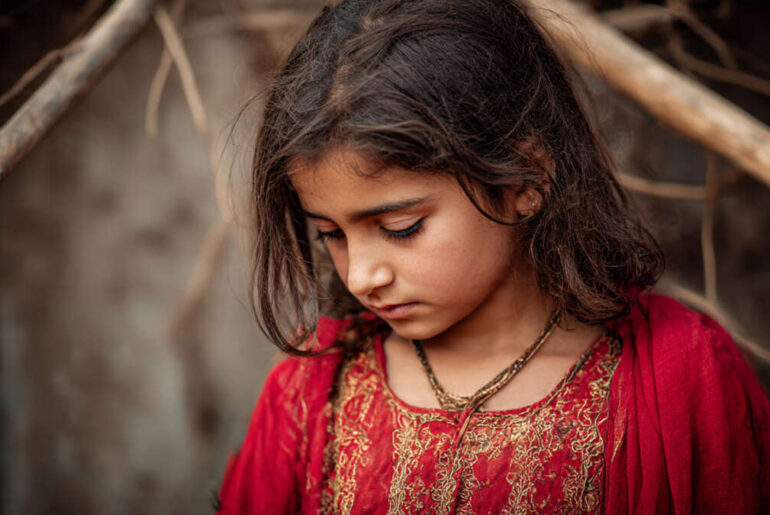Fozia Khan lay on her Charpoy under the open sky. The night in the Tank district was still. From far away came the sound of frogs near the water channel, and sometimes a dog barked in the distance. The moonlight made her face even more beautiful, and her eyes stayed open, full of thoughts. She was not thinking about sleep. She was thinking about her future, life and the people around her.
She wanted to become a doctor, not for pride or money but to bring change to her village. Whenever floods came, people were trapped. Women suffered the most. There were no schools, no clinics, no bridge to cross the heavy water. Many pregnant women lost their babies on the way to the hospital. Some never reached it at all. Fozia wanted to stop these stories of pain. She wanted to be the one who could save lives. She thought about the mothers wading through water, clutching their bellies, crying for help that never came. She remembered the old woman who once carried a sick child on her back, slipping in the mud, with nobody to guide her. These images burned in her mind. She could see herself running to help them, giving injections, bandages, advice, and comfort. In her mind, she felt the weight of responsibility and the fire of determination. Every face in the village seemed to ask her silently, “Will you save us?” And Fozia answered in her heart, “I will.”
In her leisure time, she imagined herself in a white coat, helping patients in a small clinic she built herself. Her mind was young, but her thoughts were old, full of questions. Why were women always made to sacrifice? Why were their dreams always buried before they even started to live them?
The next day, she sat on the mud floor with her friend Rabia Bibi. They talked about studies and the coming exams. Fozia said she would get admission to college and pass the MDCAT. She became happy when she spoke about it. Rabia teased her, saying, “You’ll forget us when you become a doctor.” Fozia laughed. But she knew her walk to success was not easy. She pictured herself travelling to the city for the exam, feeling the strange sounds of buses, the chaos of city streets, the sharp smell of petrol and spices. She imagined the college library, with shelves taller than she had ever seen, and the smell of new books, the scratch of pens on paper, the other students whispering about their own ambitions. And she knew, even in that bright vision, that her path back to Tank would always be more challenging. The exams, the fees, the journey, everything was a mountain. But she felt that one day she would climb it.
Later that day, two little girls came running to her house. Their faces were pale, and their words came fast. They said the jirga elders had gathered in the hujra. Fozia’s brother, Karamat Ali, had killed a man in a fight. The police caught him, but the elders were angry and had taken the matter into their own hands. In Tank, the “Jirga” was more powerful than the law.
Inside the “Hujra”, old men with white beards sat on Charpoys, talking loudly. They drank green tea and argued about what to do. Some wanted Karamat Ali to be handed over to the police, while others said that would bring shame to the family. Hours passed. Fozia’s mother waited outside, praying that her son would not be punished with death. With each passing hour, the anxiety grew heavier. Fozia felt the heat of the sun on her back, even though she sat in the shade, and imagined the elders’ whispers, the tapping of feet, the smoke of cigarettes curling in the air, the clatter of chai cups, the murmur of villagers outside. Her heart was heavy with every sound. She wanted to shout, to run inside, to beg the elders to spare her brother, but she could not. Every thought collided with fear, and every fear collided with the impossible weight of tradition.
After three hours, the “Jirga” gave its decision. They said Karamat Ali would not be hanged or jailed. Instead, his sister, Fozia, would marry the brother of the man he had killed. The man’s name was Qudus Khan. He was a sheep herder known for his laziness and smoking. For the elders, this was justice. The people clapped and congratulated each other. Goats were slaughtered, and food was prepared to celebrate. Some men cheered loudly, others laughed, and the smell of spices and roasting meat filled the air. For them, life continued normally. For Fozia, a dream was torn apart, replaced with a destiny that felt like a cage. She wanted to cry out, to tell someone, anyone, that this was wrong, but the words stuck in her throat.
When Fozia heard the decision, her whole body went cold. Just hours ago, she was planning her studies. Now she was being given to a stranger to pay for her brother’s crime. Even her mother, though sad, felt some relief that her son’s life was spared. Karamat Ali told her to accept it quietly. He said, “It is written. What can we do now?”
Fozia said nothing. Her lips were dry, and no sound came out. Her dreams were broken in front of her eyes. That night, she cooked food for the guests who had gathered to eat and praise the “Jirga’s” wisdom. She stirred the pot and wiped her tears with her sleeve. Nobody looked at her face. Nobody cared what she felt. For them, she was only a daughter of Tank, born to obey and sacrifice.
Outside, the moon still shone on the village, but for Fozia, the night had no light left in it. She remembered every detail of her morning, every step toward school, every word she had spoken with Rabia Bibi. The future she had imagined —wearing the white coat, caring for patients, and working in the small clinic —was gone. All that remained was silence, the smell of cooking fires, the croak of frogs, and the heavy weight of injustice that settled over her like a blanket she could not remove. The Charpoy felt hard beneath her back, her heart heavier than the earth itself. Three hours had stolen everything she had held dear. She closed her eyes, but the world around her was awake, indifferent to the loss of a young girl’s life, her books, her ambitions, and her right to choose.







